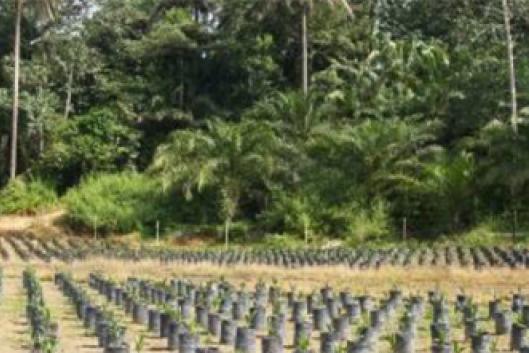A few corporations will concentrate control of more than 75% of the arable land in the Pujehun district for large-scale industrial agriculture, primarily oil palm plantations depriving local farming communities of their land and trees.
Following a global trend, companies and investors, by way of large-scale land leases,are taking over significant areas in Sierra Leone, a countryof about 7.2 million hectares of which 74 percent is considered suitable for agriculture and where about 60 percent ofthe population - some 3.5 million - depends on smallholder agriculture for their livelihoods.
Research undertaken by the Oakland Institute and GreenScenery in late 2010 showed that more than 500,000 hectares had been or were being acquired by foreign investors in Sierra Leone and particularly in the Pujehun district.
Following up the process, in a recent report and based on figures from registered land leases, Green Scenery calculates that 60% of the total area in Pujehun district is already being, or could soon be converted into large-scale industrial agriculture, primarily into oil palm plantations. That would imply that a few corporations will concentrate control of more than 75% of the arable land in the district. Just one company, Biopalm Energy Limited, registered in Singapore and part of the Indian SIVA Group, controls nearly 98,500 hectares, close to one quarter (23.9%) of the entire Pujehun District.
The research found that a small group of people has been behind several different companies involved in the land deals in Pujehun District revealing that the main intention behind the land acquisitions is speculation for high rates of return from the transfers rather than to create new opportunities for farmers and local communities to improve their lives, or even for revenue to the state.
Leasing of large tracts of land to investors for 50 to 100 years will deprive local farming communities of their land and trees, leaving them with very little to live off.
In most cases consultations were found to lack legitimacy as long as very few stakeholders participate in the initial stage, youth and women were excluded from decision-making, chiefdom authorities were not fully aware of the registered documents or their details - such as the size, the survey map, the length of the lease, payment procedures - and they seemed unaware that these leases were binding documents.
All in all it’s the big companies which get the major profit while smallholders, who are the pillars of the country’s food security with crops such as rice, cassava, sweet potato, groundnut and palm oil, will face a dramatic reduction in farmland availability.
This will inevitably affect food security, says Green Scenery, which has released a press release denouncing the situation and calling on international partners of Sierra Leone to recognize findings from civil society organizations and grievances of affected chiefdoms and communities. Green Scenery demands the government to re-examine the policy to attract foreign private investment in agriculture for large-scale monoculture and to place and enforce a moratorium on large-scale investment in agriculture before it is too late.
Article based on the Press Release “Is our country part of the ‘wild west’? A moratorium on large-scale land leases for agriculture is urgently needed in Sierra Leone,” Green Scenery,www.greenscenery.org/publications; and on the report “Land Investment Deals In Sierra Leone. Green Scenery Briefings Part I – IV,” http://www.oaklandinstitute.org/sites/oaklandinstitute.org/files/2011_10_
GS%20Briefings_layout_web.pdf
